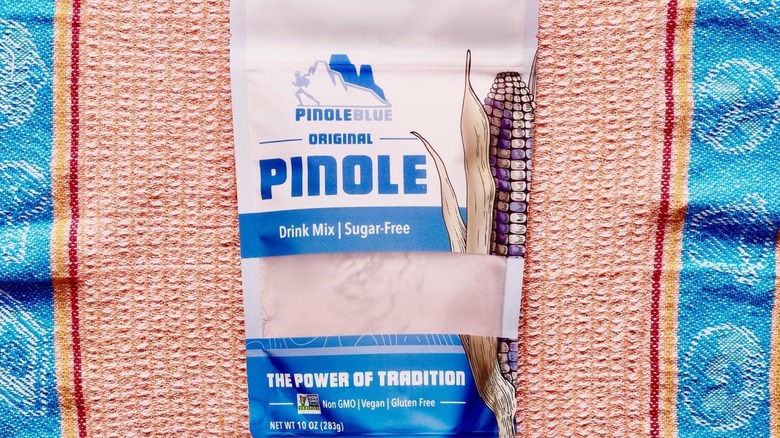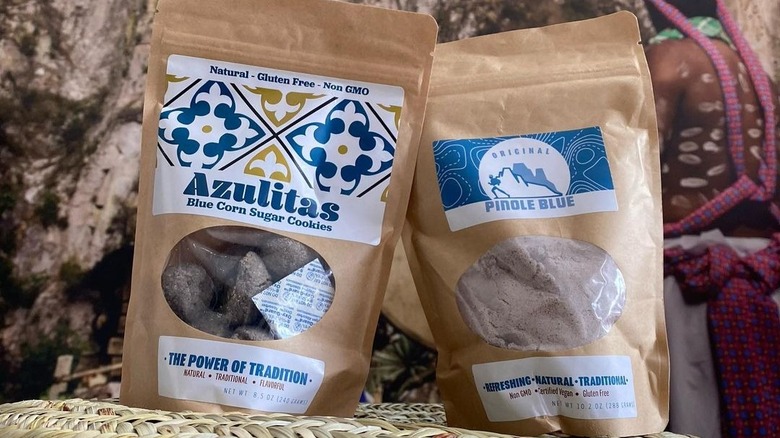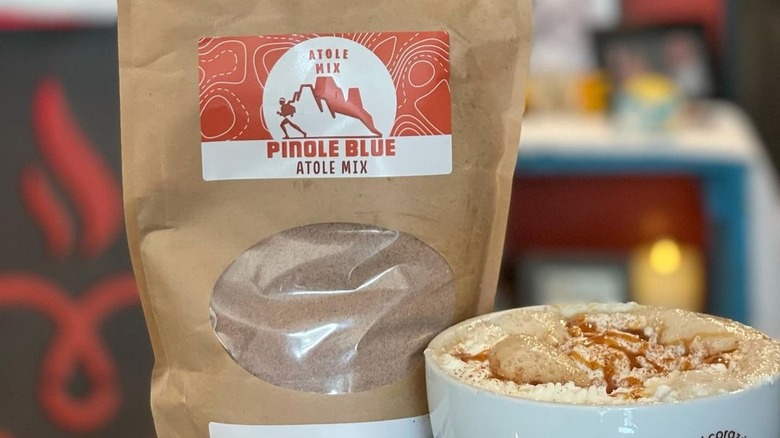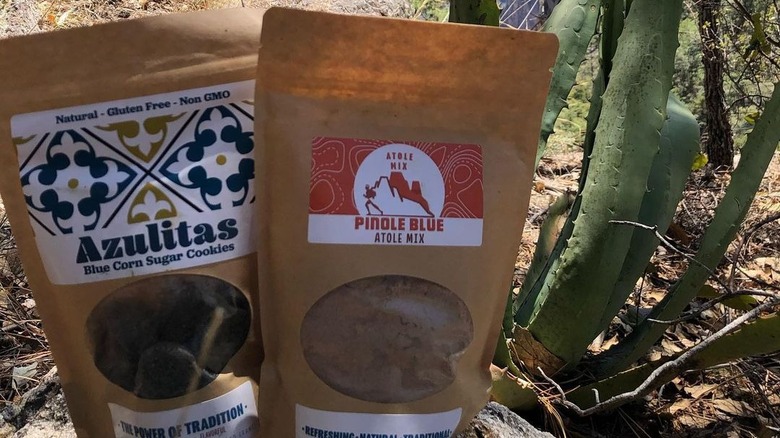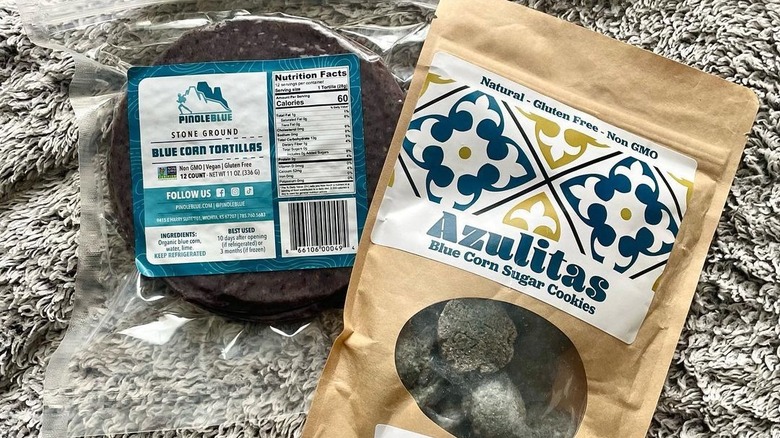Pinole Blue: Here's What Happened After Shark Tank
In its two-decade-long history, "Shark Tank" has catapulted many small businesses into multimillion-dollar companies, but there's more to the show than just the investments. Over the years, the show has given several up-and-coming enterprises much-needed nationwide publicity, and in return, introduced viewers to innovative products that they may never have heard of before. One such business was Season 14, Episode 13's Pinole Blue.
Pinole Blue was the brainchild of Eddie Sandoval, a Wichita State University student who had grown up around pinole thanks to family in Chihuahua, Mexico. Made from roasted and ground blue corn, Sandoval said that pinole — especially when mixed with water — was an ancient superfood that the indigenous Tarahumara community consumed to endure 100-mile runs in the mountains of Mexico. Noticing a lack of pinole in the U.S., Sandoval brought the idea of Pinole Blue to his university professor, Kate Kung-Mclntyre.
Sensing that Sandoval was onto something, Kung-Mclntyre encouraged her student to steamroll ahead with Pinole Blue. Sandoval rushed off to Mexico to buy half a ton of heirloom blue corn, which he began roasting and grinding by hand in his dorm room. Soon, Sandoval had snagged first place for Pinole Blue at the WSU New Venture competition with the help of Kung-Mclntyre — who went on to become its co-founder — and the company began selling drink mixes and tortillas made from stoneground blue corn together with another business partner and fellow university student, Kyle Offutt, who came on board as a social media consultant.
What happened to Pinole Blue on Shark Tank?
Some businesses that appear on "Shark Tank" excite the Sharks enough for them to fight each other over negotiations. Pinole Blue, however, was among some of the shortest "Shark Tank" pitches. Sandoval walked into "Shark Tank" with Kung-Mclntyre and Offutt hoping to secure a $300,000 investment in exchange for a 10% stake in Pinole Blue, but things didn't exactly go the way he had hoped.
While Pinole Blue's drink mixes, tortillas, cookies, and protein balls got a thumbs up, the sharks were skeptical about everything else. At the time of their appearance on the show, the entrepreneurs had made $720,000 in lifetime sales and were on track to make another $730,000 in that year alone. But with little more than $5,000 in net profit the year before, Pinole Blue failed to impress — and before the entrepreneurs could talk about their plans for scaling the business or even where Pinole Blue's products were being sold, the Sharks quickly backed out.
Mark Cuban thought that Pinole Blue was too specific to the Hispanic and Latin communities and speculated that educating new customers about pinole would be a problem that would stop Pinole Blue from turning into a multimillion-dollar company. Barbara Corcoran, Lori Greiner, Emma Grede, and Kevin O'Leary all went on to agree that while their products were good, it was too early to judge whether Pinole Blue would turn out to be a profitable business or not, leaving the entrepreneurs without a single offer on the table.
Pinole Blue after Shark Tank
Although Pinole Blue walked out of "Shark Tank" without securing a deal, if there's one thing that fans know, it's that an investment isn't always everything. In an interview with Kake, Offutt said that regardless of the results, "it's like always been a dream to be on the biggest platform that you can be for starting a business no matter what." This is because simply appearing on "Shark Tank" gives small businesses nationwide publicity and exposure, which brings in new customers who, in turn, bring more sales. Dubbed the Shark Tank Effect, this phenomenon seems to have applied to Pinole Blue too except, rather than being surprised by an influx of sales after their episode aired, Pinole Blue was very much ready for it.
The entrepreneurs shared several videos on Instagram leading up to the premiere of their episode, each showing how Pinole Blue was ramping up its production to meet the large number of orders that the show was likely going to bring for them. As it turns out, the founders were spot on in their prediction because Sandoval later reported that there were over 30,000 people on Pinole Blue's website after the episode aired. A re-run of their episode a few months later brought about another boost in sales, which means that, while Pinole Blue may not have succeeded at winning over a Shark, they did get more publicity, traffic, customers, and revenue after "Shark Tank."
Is Pinole Blue still in business?
Following the rocky ending to their pitch, Offutt walked off saying that the Sharks had made "a huge mistake" in the exit interview with Sandoval piping in to say that despite the lack of an offer, they weren't going to stop grinding for the business. Sandoval's words may have very well been true because Pinole Blue is still in business.
The entrepreneurs continue to sell their blue corn tortillas, drink mixes, cookies, and protein bars through Pinole Blue's website, though more varieties have been added to the existing range. Pinole Blue introduced pink corn, white corn, and green corn tortillas made with cactus on top of the original blue corn tortillas. They have also added more flavors to their drink mixes including one that is made from chocolate as well as sugar-free and sweetened options.
While Sandoval's journey began when Pinole Blue won the WSU New Venture competition, that wasn't the last award that he would win; Pinole Blue's blue corn tortillas also won the Good Food Awards in 2022. The company went on to win FedEx's Small Business Grant Contest in 2023 as well — all with the help of 34,000 followers on Instagram who are always kept in the loop with regular updates.
What's next for Pinole Blue?
While Pinole Blue's social media accounts are always updated with new recipes and even discounts, Offutt — who handled the company's social media — seems to have parted ways with Pinole Blue to pursue his own career as a social media influencer, leaving Pinole Blue in the hands of Sandoval and Kung-Mclntyre.
According to an overview of what 2022 looked like for Pinole Blue on Instagram, the entrepreneurs have revamped the packaging, launched a Kickstarter campaign to help fund new chocolate chip cookies, and introduced their pinole goodies to "Next Level Chef" winner Pyet DeSpain and "Born to Run" author Christopher McDougall. If 2022 was any indication, the entrepreneurs may already be planning on introducing more new items. Sandoval also plans to use the FedEx Small Business Grant — which gives as much as $5000 to each winner — toward new packaging and an improved website.
Since appearing on the show, Pinole Blue's products have been sold in three Whole Foods stores in Kansas and one in Missouri, but Sandoval has plans to take them to more grocery stores and sports retailers across the country. Sandoval also uses Pinole Blue as a platform to give back to the Tarahumara community by organizing food drives as well as supporting female artisans in the region and donating a portion of their sales to the community. As Pinole Blue continues to grow, Sandoval's effort to give back to the Tarahumara community will very likely grow with it.

